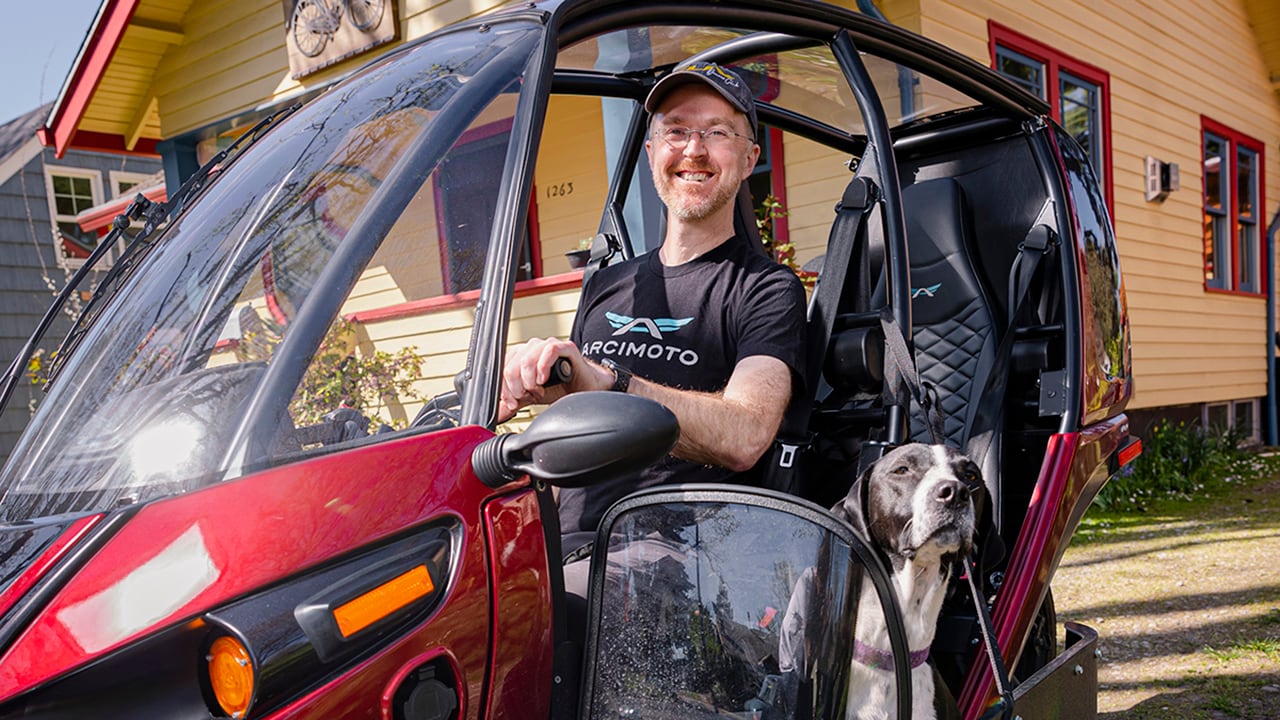Mark Frohnmayer has heard the outcry. He’s building doors for the Arcimoto.
For nearly two years, the the Eugene-based electric-vehicle entrepreneur has manufactured three-wheeled rigs designed for short trips. Even as Arcimoto’s stock price has soared—reaching $36 in February, and leveling out to $8 a share now—doubters have wondered whether Americans will hop into a vehicle that is classified as a motorcycle, but looks more like George Jetson designed an auto rickshaw.
The most common question, especially amid Oregon rain: Where are the doors?
Frohnmayer answered that query on May 21 in conversation with reporter Anthony Effinger at TechfestNW. He says Arcimoto is designing two kinds of doors for the Fun Utility Vehicle: half doors now, and full, detachable doors soon.
“I drive it year-round, open,” said Frohnmayer. He says he envisions the FUV like a Jeep: doorless in most circumstances, but with weather shields if you want them. “Where we see our early, big-market opportunities, in the Sun Belt, it’s really not an issue.”
The door discussion, a natural outcome of a vehicle that’s a little bit car and a little bit bike, linked to a larger theme of Frohnmayer’s remarks Friday: He’s trying to scale down the size of American vehicles, and reduce the square miles where cities are caked in asphalt.
That aspect of Arcimoto’s mission is newly relevant this week, as Ford debuted plans for an electric F-150, the most popular truck in America. That announcement buoyed hopes that the nation is shifting away from fossil fuels.
That’s one of two reasons Frohnmayer founded Arcimoto. But the mammoth F-150 still hogs space. And that stands in contrast to the second part of Frohnmayer’s vision, to “make cities not suck anymore.”
He argued that car-centric infrastructure has destroyed America’s urban life. “When you think about the user experience of cities, it’s lame,” he said. “It’s paved over, loud, obnoxiously smelly, and you’ve got these huge vehicles that pose a safety risk to everybody else.”
Frohnmayer said the problem starts with size. American cars and trucks are simply too big for the tasks they’re used to accomplish.
“The average car is like 4,000 pounds,” he said. “It’s like 20 of me on a good day. It’s the entire offensive line of a professional football team. It’s that amount of mass carrying you to get a cup of coffee.”
American cities are designed to accommodate those behemoths. Only by scaling down the typical vehicle size, he said, could planners return cities to a human scale.
Frohnmayer has previously described how the FUV would be used primarily for short city trips. But on Friday he sketched a vision of a shared fleet of Arcimotos, like Portland’s bike-share program Niketown. But with a twist: Automation might allow those vehicles to arrive at the driver’s request, like an Uber that lets you take the wheel.
Suddenly, the 6 to 7 parking spaces dedicated to every car in a given city would become superfluous. And perhaps they would become something else: “We can use a much smaller number of vehicles, taking up radically less space, and then use that space for other purposes, like parks or housing.”
If all that seems fanciful for an EV company still working on doors, Frohnmayer dropped more immediate news: Arcimoto is launching rental fleets in U.S. cities this summer.
The first rental Arcimotos became available two weeks ago in San Diego.

